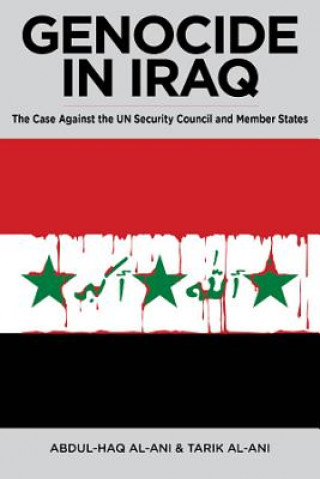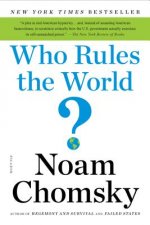
Kod: 01211554
Genocide in Iraq
Autor Abdul Haq Al Ani
Imposing sanctions on Iraq was one of the most heinous of crimes committed in the 20th century. Yet it has received little attention in the Anglo-American world. Despite the calamitous destruction resulting from the sanctions, no ... więcej
- Język:
 Angielski
Angielski - Oprawa: Miękka
- Liczba stron: 167
Wydawca: Clarity Press, 2013
- Więcej informacji o książce

109.64 zł
Zwykle: 115.48 zł
Oszczędzasz 5.84 zł
Dostępność:
50 % szansa Otrzymaliśmy informację, że książka może być ponownie dostępna. Na podstawie państwa zamówienia, postaramy się książkę sprowadzić w terminie do 6 tygodni. Gwarancja pełnego zwrotu pieniędzy, jeśli książka nie zostanie zabezpieczona.
Otrzymaliśmy informację, że książka może być ponownie dostępna. Na podstawie państwa zamówienia, postaramy się książkę sprowadzić w terminie do 6 tygodni. Gwarancja pełnego zwrotu pieniędzy, jeśli książka nie zostanie zabezpieczona.Przeszukamy cały świat
Zobacz książki o podobnej tematyce
-

Painterly Days Pattern
107.62 zł -11 % -

Correlations and Connectivity
1121.43 zł -

Culture and Values
503.62 zł -

Cambridge Black Star English for Senior High Schools Teacher's Guide 2
22.14 zł -5 % -

Little Girl in Old Philadelphia
165.62 zł -

Chieftain
43.89 zł -11 % -

Interface Controlled Organic Thin Films
868.21 zł
Podaruj tę książkę jeszcze dziś
- Zamów książkę i wybierz "Wyślij jako prezent".
- Natychmiast wyślemy Ci bon podarunkowy, który możesz przekazać adresatowi prezentu.
- Książka zostanie wysłana do adresata, a Ty o nic nie musisz się martwić.
Powiadomienie o dostępności
Wpisz swój adres e-mail, aby otrzymać od nas powiadomienie,
gdy książka będzie dostępna. Proste, prawda?
Więcej informacji o Genocide in Iraq
Za ten zakup dostaniesz 64 punkty
 Opis
Opis
Imposing sanctions on Iraq was one of the most heinous of crimes committed in the 20th century. Yet it has received little attention in the Anglo-American world. Despite the calamitous destruction resulting from the sanctions, no serious attempts by legal professionals, academics or philosophers have been undertaken to address the full scope of the immorality and illegality of such a criminal and unprecedented mass punishment. "Genocide in Iraq" offers a comprehensive coverage of Iraq's politics, its building, its destruction through aggression and sanctions, and an analysis of the legality of these sanctions from the point of view of international and human rights laws. It presents a detailed policy analysis indicating how, under Ba'ath rule, Iraq had risen to become - before 12 years of total sanctions were globally enforced - the most progressive and developed Arab nation in the Middle East. It then contrasts that rising nation to the devastated remains left in the aftermath of sanctions, which nonetheless was yet to endure, in 2003, the full force of the American "shock and awe" invasion. The book explains why it was necessary to occupy Baghdad. It also puts forward the uniqueness of Iraq as at the heart of both Sunni and Shi'a theology, arguing it was this very centrality of Iraq, which far outweighs the significance of Arabia in socio-economic, religious and geostrategic dimensions, that at the same time makes Iraq a target. It details the building of Iraq by the Ba'ath regime, part of which was done with remarkable speed, putting to rest the argument that other countries in the area were developed at a similar pace. It also details the devastation of Iraq by 2003 after 12 years of sanctions - a devastation so dreadful that by the UN's own accounting, some 500,000 child deaths were due to it; a devastation so pervasive and overwhelming that two of the UN's own key administrators of the sanctions program, Dennis Halliday and Hans von Sponeck, resigned in protest. No other book published in English has made such an in-depth research and comparison of the two eras. Although previous books may have touched on the breach of international law through sanctions, this book, while making similar arguments on the breach of international humanitarian and human rights law, goes further and argues that the Security Council itself, member states and the individual relevant members of the governments of that period are guilty of these crimes. More significantly, the book argues for the first time that imposing total sanctions is the equivalent of committing genocide. It challenges the argument by some that there is any need to establish specific intent to establish the crime of Genocide. In its section dealing with the Sanction Committee, it demonstrates how one man at any time could hold the whole of Iraq to ransom by denying the export of items so vital to the basic survival needs of millions. The little that has been written has concentrated on a single aspect of the effects or consequences of the sanctions; mostly in articles in dedicated journals whose readership is limited. But as the crime of genocide is one on which there is no statute of limitations, it is hoped that this book will serve not only as an indictment of and barrier to future global imposition of sanctions, but also as a tool in bringing the actual perpetrators of this crime to a Nuremberg-style day of judgment.
 Szczegóły książki
Szczegóły książki
Kategoria Książki po angielsku Society & social sciences Politics & government International relations
109.64 zł
- Pełny tytuł: Genocide in Iraq
- Autor: Abdul Haq Al Ani
- Język:
 Angielski
Angielski - Oprawa: Miękka
- Liczba stron: 167
- EAN: 9780985335304
- ISBN: 0985335300
- ID: 01211554
- Wydawca: Clarity Press
- Waga: 388 g
- Wymiary: 154 × 229 × 17 mm
- Data wydania: 01. March 2013
Ulubione w innej kategorii
-

On Palestine
47.31 zł -23 % -

Prisoners of Geography
47.31 zł -23 % -

World Order
51.84 zł -23 % -

International Relations, Global Edition
423.78 zł -

Grand Chessboard
96.25 zł -

Diplomacy
78.93 zł -14 % -

Clash of Civilizations and the Remaking of World Order
73.59 zł -15 % -

Hundred-Year Marathon
88.90 zł -10 % -

The Spy and the Traitor
52.35 zł -15 % -

Understanding the Intelligence Cycle
310.71 zł -

Who Rules the World?
51.84 zł -23 % -

Who Rules the World?
48.92 zł -14 % -

Dead Aid
73.59 zł -5 % -

World Order
61.21 zł -15 % -

Adults In The Room
61.21 zł -15 % -

Legacy of Ashes
77.22 zł -14 % -

Evolution of Cooperation
81.35 zł -

Strategic Vision
70.37 zł -23 % -

Secret World
87.89 zł -14 % -

Geopolitics and Geoculture
93.12 zł -29 % -

Dawn of Eurasia
51.84 zł -23 % -

How Spies Think
52.35 zł -15 % -

Gaza in Crisis
51.84 zł -23 % -

Planetary Cycles Mundane Astrology
93.83 zł -

OVERTHROW : AMERICA'S CENTURY OF REGIME
109.44 zł -5 % -

Is the EU Doomed?
104.70 zł -

Directorate S
85.57 zł -5 % -

Righteous Victims
101.58 zł -4 % -

Europe's Border Crisis
176.19 zł -

America's Strategy in World Politics
326.21 zł -

Destroying Libya and World Order
94.23 zł -

amantes del fin del mundo
93.15 zł -

My Nationalist Pony
146.49 zł -

Critical Practices in International Theory
901.84 zł -

American Century and Beyond
101.58 zł -4 % -

Heroic Failure
48.92 zł -14 % -

Oxford Handbook of the European Union
225.33 zł -

Rise and Kill First
79.43 zł -23 % -

PEACE TO END ALL PEACE
98.46 zł -14 % -

Tragedy of Great Power Politics
95.74 zł -4 % -

Countdown to Zero Day
81.65 zł -5 % -

Revenge of Geography
84.26 zł -15 % -

Political Order and Political Decay
70.37 zł -23 % -

Naked Diplomat
61.11 zł -23 % -

Against Our Better Judgment
54.36 zł -

After the Empire
61.71 zł -

Legacy of Ashes
88.69 zł -23 % -

Dragons and the Snakes
136.22 zł -9 % -

Oxford IB Diploma Programme: Global Politics Course Book
265.30 zł
zadowolonych klientów
Od roku 2008 obsłużyliśmy wielu miłośników książek, ale dla nas każdy był tym wyjątkowym.
Copyright! ©2008-24 libristo.pl Wszelkie prawa zastrzeżonePrywatnieCookies


 21 milionów książek
21 milionów książek Dostawa 10.99 zł
Dostawa 10.99 zł (32) 444 93 66 (8-15.30h)
(32) 444 93 66 (8-15.30h)